Trump says Waltz doesn’t need to apologize over Signal text chain leak: ‘Doing his best’
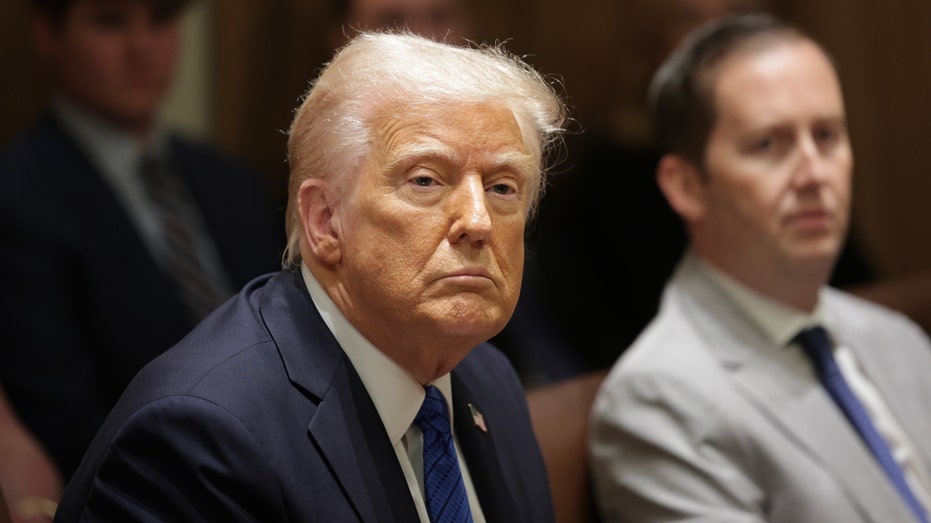
President Donald Trump defended National Security Advisor Michael Waltz during an ambassador meeting on Monday, as his administration faces fierce backlash over the recent Signal text chain leak. Waltz, whose staffers had unknowingly added The Atlantic editor-in-chief Jeffrey Goldberg to a Signal group chat where Secretary of State Pete Hegseth and others discussed sensitive war plans, has come under fire for the blunder. Speaking to a room full of reporters, Trump said he believes Waltz is “doing his best.” “I don’t think he should apologize,” the president said. “I think he’s doing his best. It’s equipment and technology that’s not perfect.” “And, probably, he won’t be using it again, at least not in the very near future,” he added. TRUMP NOMINATES SUSAN MONAREZ TO BECOME THE NEXT CDC DIRECTOR, SAYS AMERICANS ‘LOST CONFIDENCE’ IN AGENCY Goldberg was added to the national security discussion, called “Houthi PC Small Group”, earlier in March. He was able to learn about attacks against Houthi fighters in Yemen long before the public. “According to the lengthy Hegseth text, the first detonations in Yemen would be felt two hours hence, at 1:45 p.m. eastern time,” Goldberg wrote in his piece about the experience. “So I waited in my car in a supermarket parking lot. If this Signal chat was real, I reasoned, Houthi targets would soon be bombed. At about 1:55, I checked X and searched Yemen. Explosions were then being heard across Sanaa, the capital city.” Though Goldberg’s inclusion in the chat did not foil the military’s plans, the national security breach has still stunned both supporters and critics of the Trump administration. During the Tuesday meeting, Trump also said that he was in contact with Waltz over whether hackers can break into Signal conversations. IMPEACHMENT ARTICLES HIT JUDGE WHO ORDERED TRUMP TO STOP DEPORTATION FLIGHTS “Are people able to break into conversations? And if that’s true, we’re gonna have to find some other form of device,” Trump said. “And I think that’s something that we may have to do. Some people like Signal very much, other people probably don’t, but we’ll look into it.” “Michael, I’ve asked you to immediately study that and find out if people are able to break into a system,” he added. In response, Waltz assured Trump that he has White House technical experts “looking at” the situation, along with legal teams. “And of course, we’re going to keep everything as secure as possible,” the national security official said. “No one in your national security team would ever put anyone in danger. And as you said, we’ve repeatedly said the attack was phenomenal, and it’s ongoing.”
Federal court temporarily blocks Trump admin plan to suspend refugee resettlement program
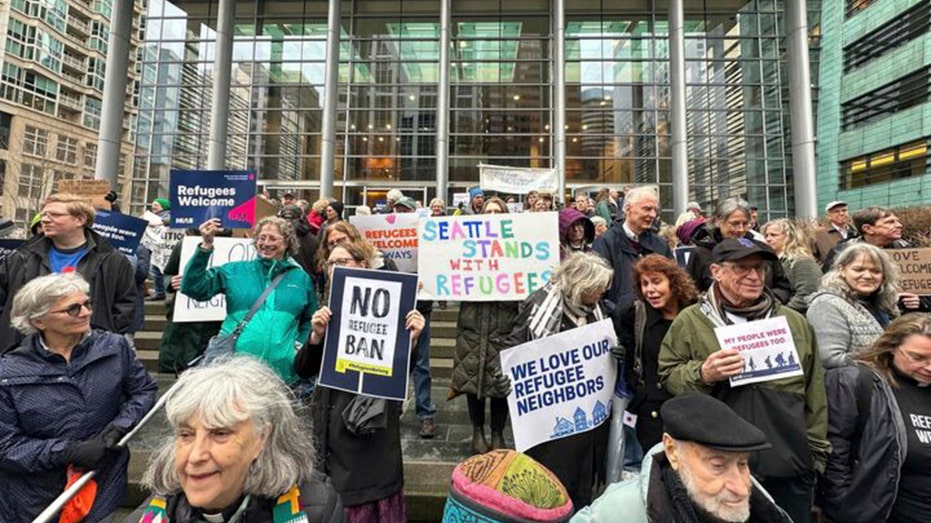
A federal court on Tuesday temporarily blocked the Trump administration from suspending a refugee resettlement program. The ruling came during a court hearing over a lawsuit brought by a group of nonprofits that receive federal funds under a congressional law. The nonprofits provide a range of social services for newly-arrived refugees in the U.S. On Monday, a judge in Seattle issued an injunction ordering the Trump administration to reinstate its contracts with refugee agencies. Tuesday’s ruling came from the three-judge panel Ninth Circuit court, which directs the administration to continue to process applications that started the process prior to Jan. 20. WHO IS JAMES BOASBERG, THE US JUDGE AT THE CENTER OF TRUMP’S DEPORTATION EFFORTS? “The motion is denied to the extent the district court’s preliminary injunction order applies to individuals who were conditionally approved for refugee status by the United States Citizenship and Immigration Services before January 20, 2025,” the order states. “Executive Order No. 14163 does not purport to revoke the refugee status of individuals who received that status under the United States Refugee Admissions Program prior to January 20, 2025. In all other respects, the district court’s February 28, 2025, preliminary injunction order is stayed.” On his first day in office, President Donald Trump signed an executive order suspending refugee resettlement and ordering the Department of Homeland Security to report back in 90 days on whether resuming resettlement would be in the interests of the U.S. ‘WOEFULLY INSUFFICIENT’: US JUDGE REAMS TRUMP ADMIN FOR DAYS-LATE DEPORTATION INFO “The United States lacks the ability to absorb large numbers of migrants, and in particular, refugees, into its communities in a manner that does not compromise the availability of resources for Americans, that protects their safety and security, and that ensures the appropriate assimilation of refugees,” Trump said in his Jan. 20 order. The case had been brought by refugee groups, including International Refugee Assistance Project, HIAS, Lutheran Community Services Northwest and individual refugees. The groups argued their ability to provide services to refugees had been damaged by the Trump order. The order was one of several attempting to limit both illegal and legal immigration, including the use of parole to allow in migrants by the Biden administration. CLICK HERE TO GET THE FOX NEWS APP Trump limited refugee resettlement in his first term, but President Joe Biden made moves to take in more refugees, including by increasing the refugee cap.
Wisconsinites kicked out and denied entry to this Democrat’s ‘fake town hall’
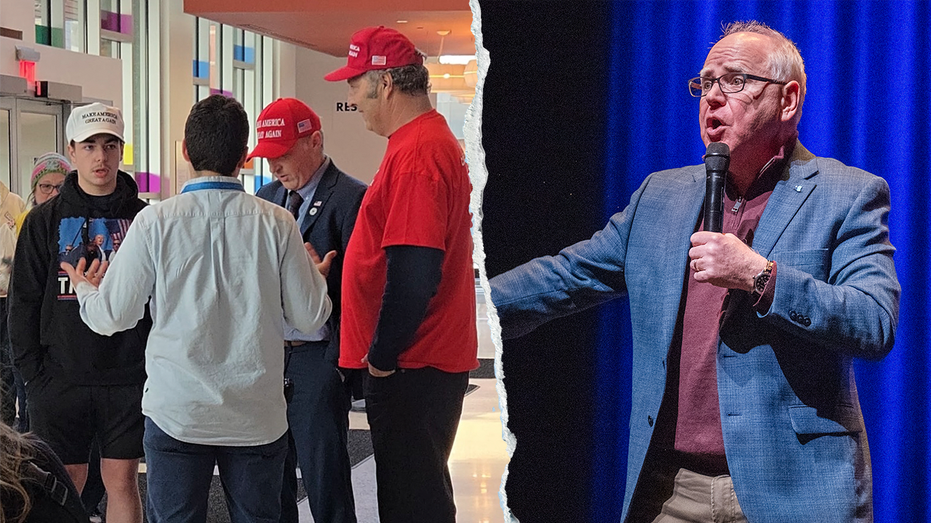
EXCLUSIVE: A Wisconsin woman was removed from a town hall hosted by Democratic Minnesota Gov. Gov. Tim Walz in Eau Claire last week after she filmed organizers blocking Trump supporters from entering. Wisconsin voter Katrina Patterson told Fox News Digital she wanted Walz to address potential cuts to Social Security and Medicare, but she was told to leave, met by law enforcement and locked outside before the town hall began. Patterson, who said she “knew that it was wrong,” filmed event organizers denying three men in “Make America Great Again” hats from entering Walz’s town hall. While she was registered for the event, Patterson only took her seat for a few minutes before she was also told to leave. “Tim Walz and the Democrats are claiming that my congressman won’t listen to his constituents, but yet we’ve got proof of them blocking Republicans from coming into their town hall,” Patterson said. “It’s really hypocritical. It makes it abundantly obvious that their town halls aren’t real. For lack of a better word, they’re fake town halls because they only want to hear from Democrats.” DEM LEADER SWINGS THROUGH GOP-HELD DISTRICTS AFTER ‘CLOWN SHOW PROTESTS’ HALTED TOWN HALLS The former vice presidential candidate was one of the first Democrats to announce town halls in Republican-held congressional districts after the National Republican Congressional Committee (NRCC), the political campaign committee tasked with electing more Republicans to the U.S. House of Representatives, advised against town halls after ongoing disruptions by Democratic protesters discontent with President Donald Trump’s second term. TIM WALZ SAYS HE WAS JOKING WHEN HE MOCKED TESLA’S FALLING STOCK: ‘THESE PEOPLE HAVE NO SENSE OF HUMOR’ “Clearly, this political theater was designed to only engage Democrats with no real interest in listening to voters who rejected their out-of-touch agenda. Yet another embarrassing charade on Walz’s walk of shame,” NRCC spokesman Zach Bannon told Fox News Digital after Walz’s Eau Claire town hall. When Walz announced his red state tour, he framed the town halls as an opportunity for constituents in Republican districts to “make their voices heard.” “I’m hitting the road, traveling to red states across the country to lend a megaphone to the people. Your congressman may not want to listen, but they’re going to hear from us anyway,” Walz said in a post. Patterson said it’s “hypocritical” for Democrats to claim they are willing to listen when they’re blocking Republicans from entering. “They’ve got people going to some of the Republican town halls and intentionally starting chaos and trouble, and then they turn around and block Republicans from going into their town halls. It’s just horrible and hypocritical. It really is,” Patterson said. She said it felt like a “secret society” where Democrats don’t want to let in “Republicans to hear what they have to say or to speak up and give their views and opinions.” ‘CHAOS AND CONFUSION’: HOW DEMOCRATS INFILTRATED ‘THUNDEROUS’ GOP TOWN HALLS “The only reason they had to kick me out was the fact that I was catching them on camera, doing something wrong that they knew they shouldn’t do,” Patterson added. While Patterson did not get the opportunity to voice her concerns at the Walz town hall, she said Rep. Derrick Van. Orden, R-Wis., is “really reachable,” and she hasn’t had an issue getting in touch with him despite what the Democratic Party says. “Tim Walz and Democrats have been just really running him through the mud and giving him a hard time for doing virtual town halls,” Patterson said. “I watched one the other day and got to throw in some comments there. I did have one question that didn’t get answered during that one, but I’m just planning to ask him again the next time around.” Democrats launched a coordinated effort to host “People’s Town Halls” in all 50 states after disruptive protests led Republican leadership to advise against hosting in-person town halls. The Democratic National Committee (DNC) and Democratic state parties held a total of 22 events in 13 states during the first week, the DNC told Fox News Digital Friday. The events were billed as “open, inclusive and built to amplify your voice.” Walz did not respond to Fox News Digital’s request for comment.
Biden-era guidance encouraged use of Signal app by highly-targeted govt officials: ‘Best practice’
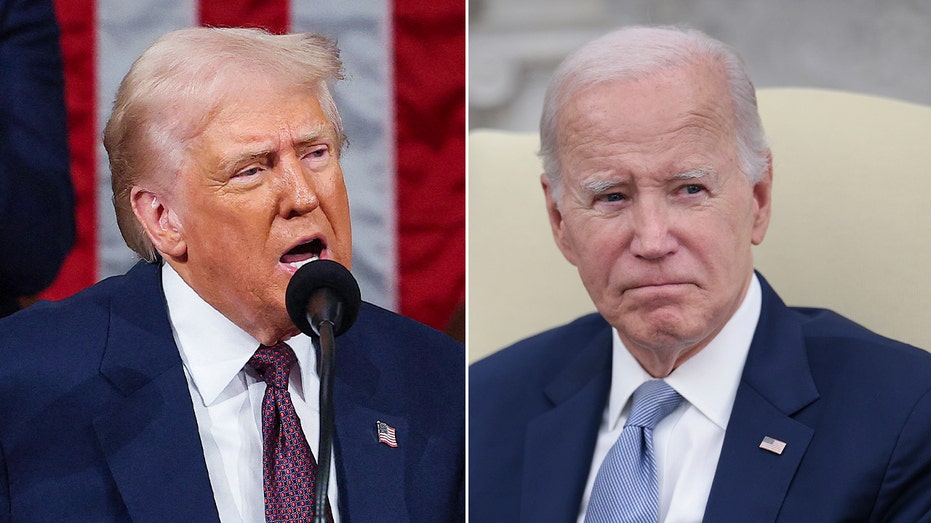
The federal office in charge of ensuring cybersecurity at all levels of the government cited the use of encrypted messaging app Signal as a “best practice” for “highly targeted” government officials, the Biden-era document shows. Fox News Digital found that the Cybersecurity and Infrastructure Security Agency (CISA) outlined in a guide for federal employees late last year that encrypted messaging platforms such as Signal better protected officials against foreign enemy hackers amid a Chinese-linked cyber breach. CISA is an office under the Department of Homeland Security’s umbrella that is charged with ensuring cybersecurity across all levels of government. Under the Biden administration in 2024, CISA released a “Mobile Communications Best Practice Guidance” for “highly targeted individuals,” who were defined as high-ranking government officials or politicians who are “likely to possess information of interest to these threat actors.” The document specifically addressed high-targeted politicos and officials, though it noted the guide was “applicable to all audiences.” “CISA strongly urges highly targeted individuals to immediately review and apply the best practices below to protect mobile communications. Highly targeted individuals should assume that all communications between mobile devices – including government and personal devices – and internet services are at risk of interception or manipulation. While no single solution eliminates all risks, implementing these best practices significantly enhances protection of sensitive communications against government-affiliated and other malicious cyber actors,” the guide reads. The document, published in December, details that highly-targeted government officials should use “end-to-end encrypted communications” as part of its “best practices” advice. End-to-end encryption is understood as a secure method of communication, where a sender’s message is encrypted and can only be decrypted by the recipient of the message. TRUMP REVEALS WHO WAS BEHIND SIGNAL TEXT CHAIN LEAK The CISA guidance specifically cited that government officials should download “end-to-end encrypted communications” platforms to their cellphones and computers, specifically citing Signal as an app to download to comply with the best practices. TRUMP OFFICIALS ACCIDENTALLY TEXT ATLANTIC JOURNALIST ABOUT MILITARY STRIKES IN APPARENT SECURITY BREACH “Adopt a free messaging application for secure communications that guarantees end-to-end encryption, such as Signal or similar apps,” the guidance states. “CISA recommends an end-to-end encrypted messaging app that is compatible with both iPhone and Android operating systems, allowing for text message interoperability across platforms. Such apps may also offer clients for MacOS, Windows, and Linux, and sometimes the web. These apps typically support one-on-one text chats, group chats with up to 1,000 participants, and encrypted voice and video calls. Additionally, they may include features like disappearing messages and images, which can enhance privacy.” Signal is an encrypted messaging app that operates similarly to texting or making phone calls, but with additional security measures that help ensure communications are kept private to those included in the correspondence. Signal’s popularity grew in the last few months, after it was discovered that Chinese-linked hackers were targeting cellphone data in the U.S., including data belonging to President Donald Trump and Vice President JD Vance during the campaign, Politico reported this week. “CISA is releasing this best practice guidance to promote protections for mobile communications from exploitation by PRC-affiliated and other malicious cyber threat actors,” the CISA guidance states, referring to the Chinese cyber breach in 2024. Fox News Digital reached out to CISA for additional comment or information on the use of Signal among government employees, but did not immediately receive a reply. WILL CAIN SHARES HIS TAKEAWAY ON THE ATLANTIC’S STORY ON THE TRUMP ADMIN’S ‘WAR PLANS’ TEXT The guidance was released months before the Trump administration came under fire from Democrats and other critics after it was revealed top national security officials discussed a planned strike in Yemen against terrorist forces in a Signal group chat that also included the editor-in-chief of the Atlantic. The Atlantic’s Jeffrey Goldberg published a first-hand account on Monday of what he read in the Signal group chat, called “Houthi PC Small Group,” after he was added to the chain on March 13 alongside high-ranking federal officials stretching from Secretary of Defense Pete Hegseth to national security advisor Mike Waltz and Trump chief of staff Susie Wiles. The Atlantic’s report set off condemnation among Democratic lawmakers, who have slammed the Trump administration for risking national security by using an app to communicate about a planned attack on Iran-backed Houthi terrorists in Yemen. TRUMP NOT PLANNING TO FIRE WALTZ AFTER NATIONAL SECURITY TEXT CHAIN LEAK “This is one of the most stunning breaches of military intelligence I have read about in a very, very long time,” Senate Minority Leader Chuck Schumer, D-N.Y., said in a floor speech on Monday. CIA Director John Ratcliffe appeared before the Senate Intelligence Committee on Tuesday morning for an annual hearing on the global threats facing the U.S., and was also grilled about the Signal group chat. The CIA chief confirmed he was in the group chat that included the Atlantic’s editor-in-chief, adding that Signal was already downloaded on his computer when he was sworn in as director in January, and that the app has a long history as a communication platform for government employees that stretched to the Biden administration. “One of the first things that happened when I was confirmed as CIA director was Signal was loaded onto my computer at, the CIA, as it is for most CIA officers, one of the things that I was briefed on very early, Senator, was by the CIA records management folks about the use of Signal as a permissible work use,” he said. “It is, that is a practice that preceded the current administration to the Biden administration,” he continued. A former Biden national security official confirmed to the Associated Press that the previous administration used Signal if a staffer was granted permission to download the app on their White House-administered phones. The staffers, however, were told to use it sparingly, according to the report. “It is my understanding that the Biden administration authorized Signal as a means of communication that was consistent with presidential recordkeeping requirements for
Fox News Politics Newsletter: Pardons from Trump
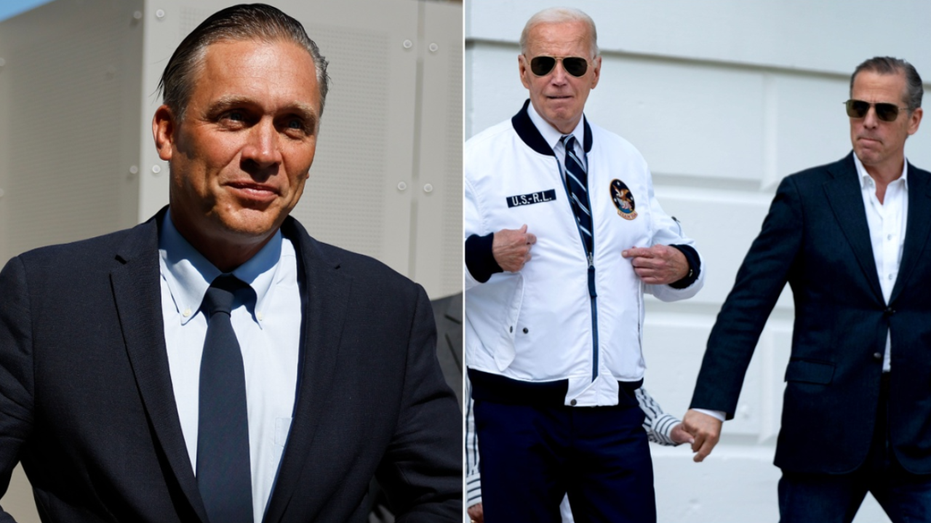
Welcome to the Fox News Politics newsletter, with the latest updates on the Trump administration, Capitol Hill and more Fox News politics content. Here’s what’s happening… -HUD joins forces with DHS to ensure federal housing resources go to US citizens, not illegal immigrants -Top Dem used same app in Atlantic scandal to set up contact with Steele dossier author -Trump admin cuts additional $1M in federal funding for ‘transgender animal’ experiments President Donald Trump on Tuesday pardoned Hunter Biden’s former business associate, Devon Archer. “Many people have asked me to do this. They think he was treated very unfairly. And I looked at the records, studied the records, and he was a victim of a crime, as far as I’m concerned. So we’re going to undo that. … Congratulations, Devon,” Trump said on Tuesday ahead of signing the pardoning. Archer was a business associate of former first son Hunter Biden at Burisma Holdings. Archer was convicted in 2018 of defrauding a Native American tribe in a scheme that involved the issuance and sale of fraudulent tribal bonds. ‘PERSONAL DIGNITY’: A second judge rules against Trump’s removal of transgender troops FULL FORCE: Staffing reductions at Education Department haven’t hit FAFSA office amid Trump cuts, agency says HHS REORGINIZATION: Trump administration to shutter HHS’ long Covid office ‘NO IMPACT AT ALL’: Trump reveals who was behind Signal text chain leak LOCK THEM UP?’: ‘The View’ hosts gleeful over Trump officials’ texting debacle, suggest some should face jail time ‘CURIOUS TO ME’: Rosie O’Donnell questions validity of Trump’s 2024 election win, wants Musk’s influence ‘investigated’ MISSING CHILDREN: State Dept says data on Ukrainian orphans is ‘secure’ despite concerns it was lost following Trump funding cut ‘HAMAS’ PROPAGANDA ARM’: Israeli hostage families sue Mahmoud Khalil, ‘Hamas propaganda arm’ at Columbia University campus SENATE SPARS OVER TEXT CHAIN LEAK: CIA Director Ratcliffe hits back on Dem senator’s group chat allegations: ‘I didn’t say any of those things’ CROCKETT CRACKDOWN: Jasmine Crockett hit with House censure threat for mocking paraplegic Texas governor as ‘hot wheels’ TESLA TANTRUM: Democrat decries FBI task force to crackdown on Tesla attacks: ‘Political weaponization of the DOJ’ ‘UNDERMINE OUR WORKERS’: GOP senator threatens ‘real consequences’ if universities hire illegal immigrants ‘FUTILE EXERCISE’: House GOP push to impeach judges blocking Trump fizzles out THE LOUDEST SILENCE: Dems who railed against domestic terrorism still silent as Trump floats 20-year jail sentence for Tesla vandals ‘BOILING POINT’: Progressive grassroots group says liberal base at ‘boiling point’ over Democratic strategy to oppose Trump PAGING PAM: CT ballot fraud saga leads GOP to alert Bondi as 150 charges lodged, Dem reforms ‘miss the mark’ ‘FREE PALESTINE!’: Anti-Israel protesters interrupt Huckabee hearing, attack Trump nominee’s faith COLLEGE TRY: Teachers union sues Trump administration over $400M cuts to Columbia University BUYER BEWARE: Illegal immigrant in Texas who purchased thousands of rounds for Mexican drug cartel gets 5 years in prison FRAUD FINDERS: Nevada investigates more than 300 potential voter fraud cases from 2024 election Get the latest updates on the Trump administration and Congress, exclusive interviews and more on FoxNews.com.
Senate committee advances nomination of Dr Oz to run Centers for Medicare and Medicaid Services
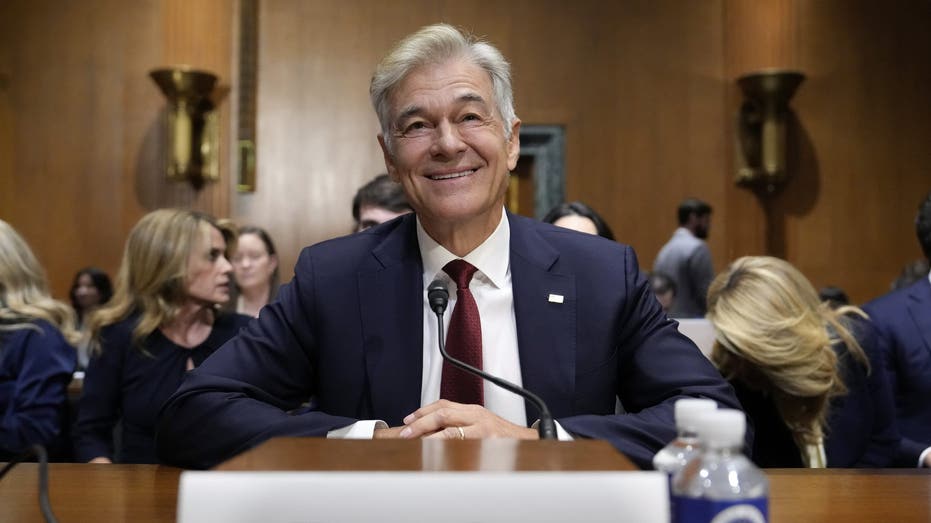
The Senate Committee on Finance voted along party lines Tuesday afternoon to advance Dr. Mehmet Oz, President Donald Trump‘s pick to lead the Centers for Medicare and Medicaid Services, to a full confirmation vote. The party-line vote, which saw 14 GOP senators vote in favor of Oz’s nomination and 13 Democrats vote against it, follows two hearings by the Senate Finance Committee that probed Oz over his plans for the federal healthcare programs, his views on abortion, potential conflicts of interest in the healthcare industry and more. “Dr. Oz has years of experience as an acclaimed physician and public health advocate. His background makes him uniquely qualified for this role, and there is no doubt that he will work tirelessly to deliver much-needed change at CMS,” Sen. Mike Crapo, R-Idaho, the chairman of the committee, said Tuesday. HAWLEY SKEPTICAL OF TRUMP PICK OZ: ‘I HOPE HE’S CHANGED HIS VIEWS’ Oz graduated from Harvard University and received medical and business degrees from the University of Pennsylvania. He is a former heart surgeon who saw his fame rise through his appearances on daytime TV and 13 seasons of “The Dr Oz Show.” Oz later transitioned into politics, launching an unsuccessful bid for Pennsylvania’s open Senate seat in 2022. He ultimately lost to John Fetterman, then the state’s lieutenant governor. If confirmed by the full Senate, Oz would be in charge of nearly $1.5 trillion in federal healthcare spending. Medicare, a federal healthcare program for seniors aged 65 and up, currently provides coverage for about 65 million Americans, according to the Center for Medicare Advocacy. Medicaid, which assists people with low incomes, covers roughly 72 million Americans, according to Medicaid.gov. DR. OZ BATS BACK DEMOCRATIC ATTEMPTS TO PAINT HIM AS A ‘SNAKE OIL’ SALESMAN IN SENATE HEARING Oz’s leadership would direct decisions related to how the government covers procedures, hospital stays and medication within the federal healthcare programs, as well as the reimbursement rates at which healthcare providers get paid for their services. Earlier this month, Trump’s pick to lead the NIH and FDA, Dr. Jay Bhattacharya and Dr. Marty Makary, respectively, were also approved in committee and are awaiting full confirmation votes in the Senate scheduled for later Tuesday. It is unclear when Oz’s full Senate vote will take place. Around the same time that Bhattacharya and Makary won committee approval, Trump withdrew his nomination of former Florida Rep. David Weldon to run the CDC, over fears he did not have the GOP support to clear full confirmation. On Monday, the Trump administration named Susan Monarez, acting director of the CDC, as its new nominee.
Trump orders FBI to declassify documents from ‘Crossfire Hurricane’ Russia investigation
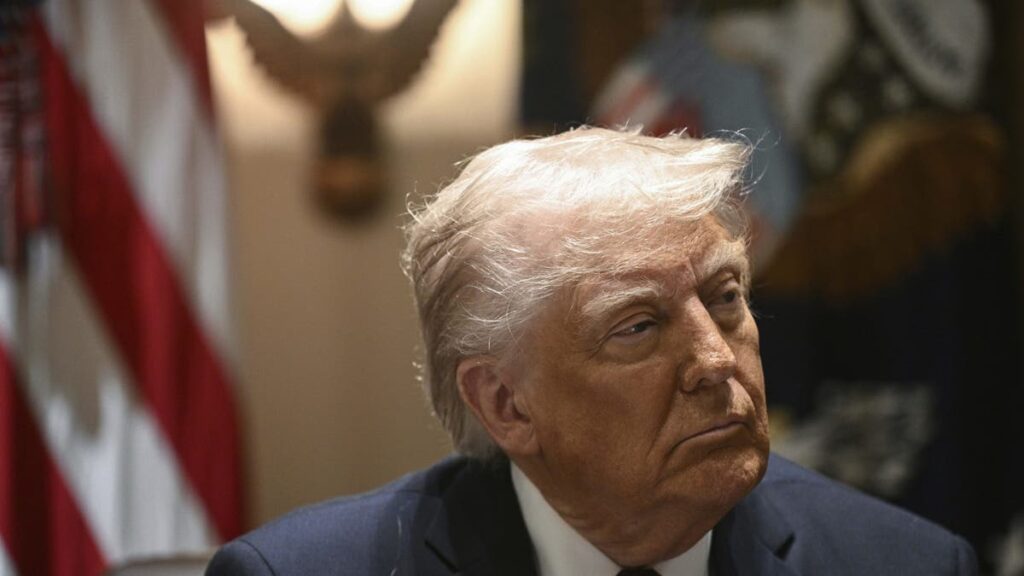
President Donald Trump signed an executive order Tuesday directing the FBI to immediately declassify files concerning the Crossfire Hurricane investigation, the agency probe launched in 2016 that sought information on whether Trump campaign members colluded with Russia during the presidential race. After signing the order, Trump said that now the media can review previously withheld files pertaining to the investigation – although he cast doubt on whether many journalists would do so. TRUMP FBI DIRECTOR KASH PATEL ‘INSTRUMENTAL IN UNRAVELING’ RUSSIA COLLUSION HOAX, FORMER CHAIR SAYS “You probably won’t bother because you’re not going to like what you see,” Trump said. “But this was total weaponization, it’s a disgrace. It should have never happened in this country. But now you’ll be able to see for yourselves. All declassified.” The FBI on July 31, 2016, opened a counterintelligence investigation into whether Trump, then a presidential candidate, or members of his campaign were colluding or coordinating with Russia to influence the 2016 election. That investigation was referred to inside the bureau as “Crossfire Hurricane.” FBI IGNORED ‘CLEAR WARNING SIGN’ OF CLINTON-LED EFFORT TO ‘MANIPULATE’ BUREAU FOR ‘POLITICAL PURPOSES’ The opening of the investigation came just days after a July 28 meeting during which then-CIA Director John Brennan briefed then-President Barack Obama on a purported proposal from one of Hillary Clinton’s campaign foreign policy advisers “to vilify Donald Trump by stirring up a scandal claiming interference by the Russian security service.” Clinton was the Democrat nominee for president that year. By January 2017, then-FBI Director James Comey had notified Trump of a dossier, known as the Steele dossier, that contained salacious and unverified allegations about Trump’s purported coordination with the Russian government, a key document prompting the opening of the probe. The dossier was authored by Christopher Steele, an ex-British intelligence officer, and commissioned by Fusion GPS. Hillary Clinton’s presidential campaign hired Fusion GPS during the 2016 election cycle. HOUSE INTEL TRANSCRIPTS SHOW TOP OBAMA OFFICIALS HAD NO ‘EMPIRICAL EVIDENCE’ OF TRUMP-RUSSIA COLLUSION It eventually was determined that the Clinton campaign and the Democratic National Committee funded the dossier through the law firm Perkins Coie. Trump fired Comey in May 2017. Days later, Robert Mueller was appointed as special counsel to take over the “Crossfire Hurricane” probe and investigate whether the Trump campaign colluded with Russia to influence the 2016 election cycle. While Mueller investigated, the House Permanent Select Committee on Intelligence opened its own investigation into alleged Trump-Russia collusion. Now-FBI Director Kash Patel, as chief investigator for then-House Intelligence Committee Chairman Devin Nunes, by February 2018 had discovered widespread government surveillance abuse, including improper surveillance of former Trump campaign aide Carter Page. Patel was an integral part of the creation of a memo released by then-Chair Nunes in February 2018, which detailed the DOJ’s and FBI’s surveillance of Page under the Foreign Intelligence Surveillance Act. Nunes and Patel revealed that the infamous anti-Trump dossier funded by Democrats “formed an essential part” of the application to spy on Page. The memo referred to closed-door testimony from former FBI Deputy Director Andrew McCabe, who said that “no surveillance warrant would have been sought” from the FISA court “without the Steele dossier information.” But when applying for the FISA warrant, the FBI omitted the origins of the dossier, specifically its funding from Clinton, who was Trump’s 2016 presidential opponent. The memo also said Steele, who worked as an FBI informant, was eventually cut off from the bureau for what the FBI described as the most serious of violations, “an unauthorized disclosure to the media of his relationship with the FBI.” FLASHBACK: DNI DECLASSIFIES BRENNAN NOTES, CIA MEMO ON HILLARY CLINTON ‘STIRRING UP’ SCANDAL BETWEEN TRUMP, RUSSIA The memo noted that the FBI and DOJ obtained “one initial FISA warrant” targeting Page and three FISA renewals from the Foreign Intelligence Surveillance Court. The statute required that every 90 days a FISA order on an American citizen “must be reviewed.” The memo revealed that Comey signed three FISA applications for Page, while McCabe, former Deputy Attorney General Rod Rosenstein, former Deputy Attorney General Sally Yates and former Acting Deputy Attorney General Dana Boente signed at least one. The memo was widely criticized by Democrats but was ultimately correct. The Justice Department inspector general, Michael Horowitz, reviewed the memo and confirmed the dossier served as the basis for the controversial FISA warrants obtained against Page. DESPITE ACQUITTAL, DURHAM TRIAL OF SUSSMANN ADDED TO EVIDENCE CLINTON CAMPAIGN PLOTTED TO TIE TRUMP TO RUSSIA Meanwhile, Special Counsel Robert Mueller completed his investigation into a possible Trump-Russia connection in April 2019. The extensive probe yielded no evidence of criminal conspiracy or coordination between the Trump campaign and Russia. After Mueller’s report was made public, then-Attorney General Bill Barr tapped John Durham, a U.S. attorney for Connecticut, to serve as special counsel to investigate the origins of “Crossfire Hurricane” itself. Durham, in his final report released in May 2023, said he found, after years of investigating, that the FBI did not have any actual evidence to support the start of that investigation. He also found that the Department of Justice and FBI “failed to uphold their mission of strict fidelity to the law” when it launched the Trump-Russia investigation. Durham also found that the FBI “failed to act” on a “clear warning sign” that the bureau was the “target” of a Clinton-led effort to “manipulate or influence the law enforcement process for political purposes” ahead of the 2016 presidential election. Durham was referring to intelligence about the Clinton plan to tie Trump to Russia to distract from the investigation into her use of a private email server and mishandling of classified information. FLASHBACK: DNI DECLASSIFIES BRENNAN NOTES, CIA MEMO ON HILLARY CLINTON ‘STIRRING UP’ SCANDAL BETWEEN TRUMP, RUSSIA Durham found that Brennan “realized the significance” of the intelligence that Clinton was stirring up a plan to tie Trump to Russia – so much so, that he “expeditiously” briefed Obama, then-Vice President Joe Biden, and other top national security officials. But nothing came
US issues demands to new Syrian government in exchange for sanctions relief
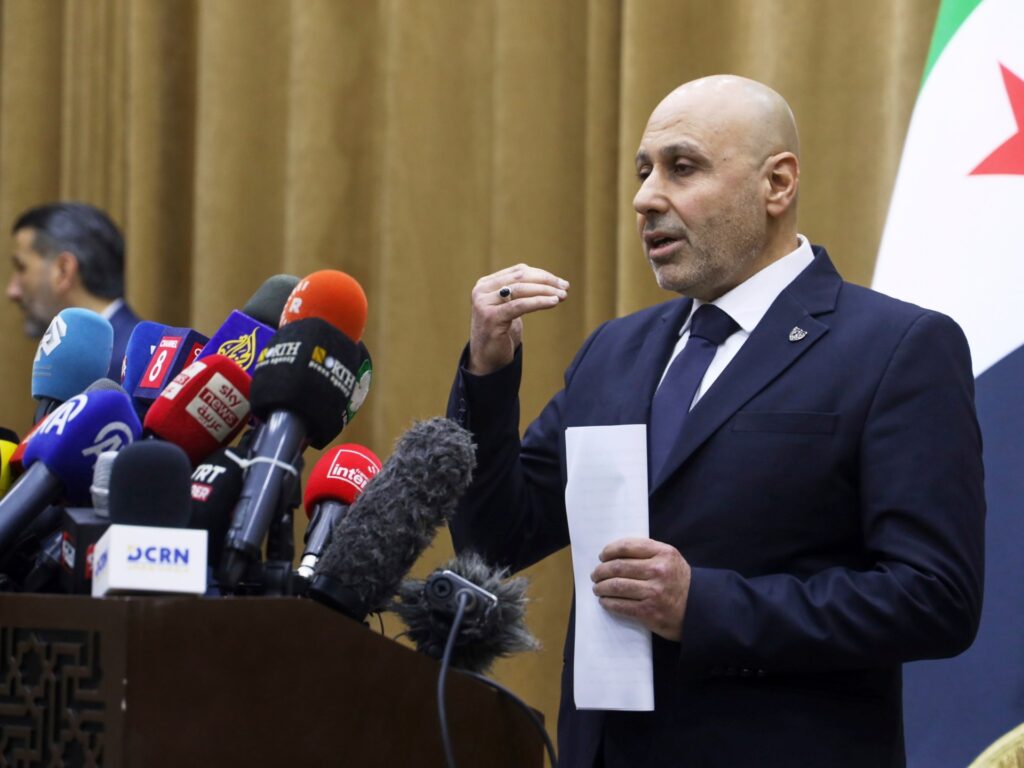
The United States has handed Syria a list of conditions that it wants Damascus to fulfil in exchange for partial sanctions relief, including ensuring foreigners are not in senior governing roles, six people familiar with the matter told Reuters. US Deputy Assistant Secretary for the Levant and Syria Natasha Franceschi gave the list of demands to Syrian Foreign Minister Asaad al-Shibani at an in-person meeting on the sidelines of a Syria donor conference in Brussels on March 18, according to two of the people: a US official and a Syrian source familiar with the matter. Neither the list nor the in-person meeting — the first high-level direct contact between Damascus and Washington since US President Donald Trump took office on January 20 — has been previously reported. Reuters spoke to six sources for this story, including two US officials, a Syrian source, a regional diplomat and two sources in Washington familiar with the matter. They all requested anonymity to discuss the high-level diplomacy. Advertisement Among the conditions placed by the United States are Syria’s destruction of any remaining chemical weapons stores and cooperation on “counterterrorism”, the two US officials, the Syrian source and both sources in Washington said. Another demand was making sure foreign fighters are not installed in senior roles in Syria’s governing structure, the US officials and one of the sources in Washington said. Syria has already appointed some foreign ex-rebels, including Uyghurs, a Jordanian and a Turk, to its defence ministry — a move that alarmed foreign governments. Washington also asked Syria to appoint a liaison to assist US efforts to find Austin Tice, the US journalist who went missing in Syria more than a decade ago, according to the two US officials and both sources in Washington. In return for fulfilling all the demands, Washington would provide some sanctions relief, all six sources said. The sources did not specify what relief would be offered, and said Washington did not provide a specific timeline for the conditions to be fulfilled. Syria’s Ministry of Foreign Affairs and the US Department of State did not respond to requests for comment. Syria is in desperate need of sanctions relief to kick-start an economy collapsed by nearly 14 years of war, during which the US, the United Kingdom and Europe placed tough sanctions on people, businesses and whole sectors of Syria’s economy in a bid to squeeze now-ousted leader Bashar al-Assad. Some of those sanctions have been temporarily suspended, with limited effect. The US issued a six-month general licence in January to ease the flow of humanitarian aid, but the move was not considered enough to allow Qatar to pay for public sector salaries through Syria’s central bank. Advertisement Syrian officials, including al-Shaibani and interim President Ahmed al-Sharaa, have called for sanctions to be fully lifted, saying it is unjust to keep them in place following al-Assad’s toppling by a lightning rebel offensive in December. A policy in progress The delivery of the demands is the clearest signal yet of the Trump administration’s policy on Syria. US statements have focused on support for minorities and condemnations of “Islamist extremism”, but they have otherwise said little, leaving uncertainty over the future of sanctions and whether US forces will remain deployed in the northeast. That is in part due to differing views in Washington on how to approach Syria. Some White House officials have been eager to take a more hardline stance, pointing to the new Syrian leadership’s former ties to al-Qaeda as reason to keep engagement to a minimum, according to diplomats and US sources familiar with the policymaking process. The State Department has sought a more nuanced approach to Syria, including possible areas of engagement, the sources added. The differences led earlier this month to a heated deliberation between the White House and State Department on US Secretary of State Marco Rubio’s statement denouncing violence in western Syria, where hundreds of civilians from the Alawite minority — al-Assad’s sect — were killed after an ambush on new security forces by armed loyalists to the former regime. Rubio condemned “radical Islamist terrorists, including foreign jihadis” who carried out the violence, and called for Syria’s interim authorities to hold perpetrators accountable. Advertisement The White House sought a more harshly worded statement while the State Department pushed back to add more balance, sources familiar with the process said. Reuters reported last month that Israel was lobbying the United States to keep Syria weak and decentralised. The administration is still not fully subscribing to Israel’s effort to discourage US engagement with Syria’s new rulers, sources said, but some of the Israeli concerns are gaining more traction with some US officials. Adblock test (Why?)
At least six people killed in Israeli attacks on southern Syria
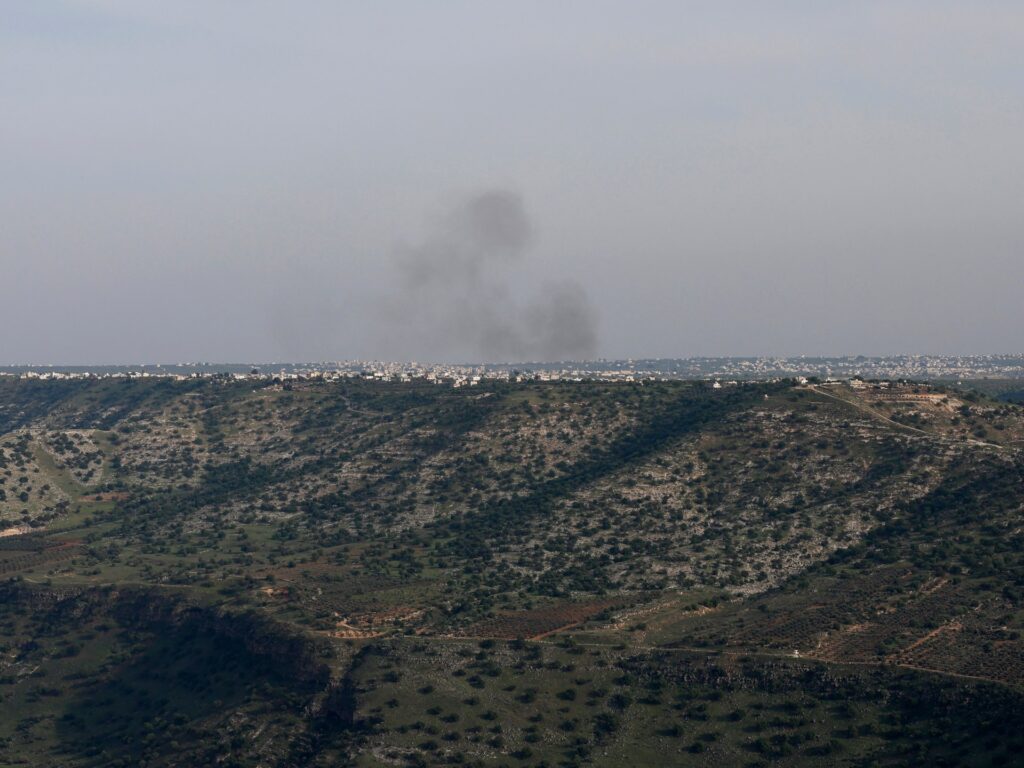
The violence in the border area marks increased friction between Israel and Syria. At least six people have been killed in an Israeli attack on Koya in southern Syria, the country’s foreign ministry says. The Israeli military said the attack on Tuesday took place after armed fighters opened fire towards Israeli troops, without specifying whether the Israeli forces were located within Syrian territory when they were targeted. It said its troops returned fire and that an Israeli warplane struck the fighters. It gave no details on casualties but said “hits were identified”. Syria’s Ministry of Foreign Affairs condemned “the continued Israeli aggression on Syrian territory, which saw a dangerous escalation in the village of Kuwayya” in the southern Deraa province. It called for an international investigation into the Israeli attacks on its territory, describing them as a “blatant violation of its sovereignty”. The Palestinian group Hamas condemned the attack on Koya “in the strongest terms”. “This fascist aggression represents a serious escalation of Zionist violations against the Syrian Arab Republic and its brotherly people, and a new war crime,” it said on Telegram on Tuesday. Advertisement The violence in the border area comes at a time of rising tensions between Israel and Syria, where a new interim government led by President Ahmad al-Sharaa has been installed after opposition fighters toppled former leader Bashar al-Assad last December. In the wake of al-Assad’s removal, Israel has launched hundreds of air strikes on military sites in Syria and sent its troops across the border into a UN-patrolled buffer zone, saying they will thwart any threats. Syria’s leadership has said it does not intend to open a front against Israel. Earlier, the Israeli military said it had “struck military capabilities that remained at the Syrian military bases of Tadmur and T4”, referring to bases in Palmyra and another 50 kilometres (30 miles) west of the city. On Friday, the military carried out strikes on the same bases. The European Union’s foreign policy chief Kaja Kallas warned on Tuesday that Israel’s strikes on Syria “risk further escalation”. Speaking at a joint news conference with Israel’s Foreign Minister Gideon Saar, Kallas said the pair had discussed Israel’s actions. “And we [the EU] feel that these things are unnecessary, because Syria is right now not attacking Israel,” Kallas said. The foreign ministry in Jordan also condemned Tuesday’s incursion and bombardment as “a dangerous escalation” that risked fuelling “further conflict and tension in the region”. Israeli Prime Minister Benjamin Netanyahu has demanded the demilitarisation of southern Syria, which borders the Israeli-annexed Golan Heights. Advertisement United Nations Special Envoy for Syria Geir Pedersen told the Security Council on Tuesday that he was “concerned by Israeli statements on the intention to stay in Syria” and demands for the full demilitarisation of the south. At an Arab summit in Cairo in early March, Syria’s al-Sharaa also called on the international community to pressure Israel to “immediately” withdraw its troops from southern Syria, calling their presence a “direct threat” to peace in the region. Adblock test (Why?)
‘On a journey’: Family mourns Hossam Shabat, journalist killed by Israel
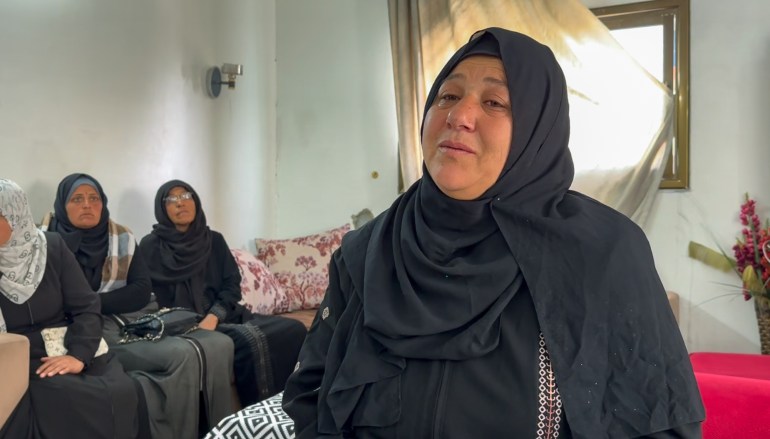
Amal Shabat is delirious with pain. She is weeping, still unable to grasp that her 23-year-old son has been killed by Israel, exactly as he always said he would die – a “martyr” who sacrificed himself to make sure the world knew what was happening in Gaza. She tries the words haltingly: “My son is a martyr, Hossam… My son is a hero.” Hossam Shabat, Al Jazeera Mubasher journalist, was killed by Israel in a targeted strike on his vehicle on Monday. A mother’s pain Amal is in Hossam’s “Dar Azaa” (house of condolences), a space opened for people to come pay their respects to the family. Sitting among female relatives, she breaks down and lowers her head on a shoulder to cry. The women do their best to comfort her, telling her Hossam died a hero, loved by everyone. In addition to his journalistic work, Hossam used his movements and connections to bring humanitarian assistance to people in need who could not access it, his family says. “He’s appeared in people’s dreams,” Amal’s sister tells her. “He was radiant, like a bridegroom.” Advertisement In moments of great pain, turning to such omens is believed to bring some relief to the bereaved. ‘My son is a hero,’ Amal says of her son, Hossam Shabat [Screengrab/Al Jazeera Mubasher] Refusing to leave the north Amal and Mahmoud, Hossam’s 28-year-old brother, speak to Al Jazeera Mubasher, alternating between resignation and tears. Amal tries to paint a picture of the son she returned to the north of Gaza to be near, only to lose him to an Israeli attack. “When we were displaced to the south, he walked with us part way, but didn’t want to leave here. The whole time we were in Nuseirat [in central Gaza], I would call and beg him to come, but he refused.” Mahmoud says Hossam was determined to document Israel’s attacks in the north of Gaza, because he knew that without coverage, the violence would be brushed under the carpet. And that was why Hossam stayed in the north, he says. Eventually, after a ceasefire was declared in late January, the family was able to return to Gaza City to reunite with Hossam. But, Amal says, even then it was hard to spend time with him and she found herself going to wherever he was working. “‘What’re you doing here, Mother?’ he’d ask me when I went to find him,” she says. “I’d answer that I was just there to see him, to spend a bit of time with him.” Mahmoud Shabat, Hossam’s brother, broke down in tears as he spoke about his brother [Screengrab/Al Jazeera Mubasher] Knowing he would die Early on in the war, Hossam had started to tell his family that he knew Israel would kill him, but that he felt it was his duty to keep doing what he was doing. Advertisement “He knew, he knew that to be a journalist in Gaza, to tell the truth, meant that he would be killed,” Mahmoud says, adding that Hossam had been threatened before and had already escaped being killed once. Watching her son rush towards danger wasn’t easy for Amal, she says. “Whenever someone called him, whenever someone said something happened somewhere, he would fly, he was like a bird. “Wherever there was destruction, wherever there was death, he would head there. I was scared, I would tell him to stay back, to stay away from the danger. “But he replied: ‘Mother, it is written, even if I were at home, if you hid me in your arms, they would kill me.’ “‘I’m a martyr, I know it,’ he’d say to me. Just think of me as being away on a journey.” And so she would wait for him, she says, waiting to hear every morning whether he was all right or if he had been killed. She soon feared the sound of phones ringing, worrying they would bring bad news. A huge outpouring of grief accompanied Hossam as he was taken to his final resting place on March 24, 2025, in Beit Hanoon, Gaza [Ahmed Al-Arini/Anadolu Agency] The heart of a child Hossam’s colleagues spoke to Al Jazeera’s Arabic site about a larger-than-life character, full of love, joy, and always willing to help. “Hossam touched people’s pain, with his camera and his voice. The people in the shelters and tents, he was completely in tune with their suffering and they loved and followed him,” Al Jazeera’s Mohamed Quraiqaa said. “He was always there – during displacements, under Israeli bombardment, and in the face of death.” Advertisement So much so, his journalist friend Youssef Fares said, that even other journalists would urge him to take it easy, to be more careful as he continued to push right ahead. “Hossam was very innocent, he had the heart … of a large child. But he was so impulsive that it went too far. “We would retreat when the bombing got too much, but he would go closer, to cover it. We were scared for him often.” ‘Hossam touched people’s pain, with his camera and his voice,’ Mohamed Quraiqaa said [Screengrab/Al Jazeera Mubasher] ‘At least I could bury him’ When Mahmoud starts talking, his eyes are red and his voice is subdued. “Hossam wanted to tell the whole truth. He wanted to transmit that to the world,” he says. “He would always, always say: ‘The coverage will continue. It will continue even if the price is death.’” Mahmoud breaks down, his words choked as he looks to the side, trying not to cry. “If a massacre happens and nobody documents it, it is as if it never happened,” he says haltingly, his lips trembling. “Someone had to do it, and Hossam was that hero. No matter how many times we told him he’d done enough, he kept telling us he couldn’t stop and even if he did, the [Israeli] occupation would never forgive him for having been a journalist.” The family worried often about something happening
